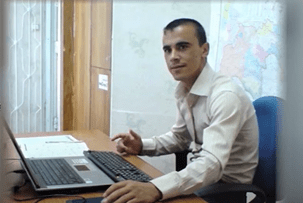Stockholm, March 17, 2023 – Tajik authorities should release journalist Khurshed Fozilov and stop prosecuting journalists in retaliation for their work, the Committee to Protect Journalists said Friday.
On March 6, officers of the State Committee for National Security in the western city of Panjakent detained Fozilov, a freelance journalist, according to news reports.
Authorities charged Fozilov with participating in banned extremist groups, but have not disclosed any specific allegations against him, a person familiar with his case told CPJ on the condition of anonymity, citing fear of reprisal. If convicted, he could face five to eight years in prison under the Tajik criminal code.
“Coming just months after Tajik authorities sentenced several journalists to lengthy prison terms without making public any compelling evidence against them, journalist Khurshed Fozilov seems trapped in the same cycle,” said Gulnoza Said, CPJ’s Europe and Central Asia program coordinator, in New York. “Tajik authorities must disclose the exact reason for Fozilov’s arrest or immediately release him, alongside all other imprisoned journalists.”
Two people familiar with Fozilov’s case told CPJ on the condition of anonymity that they believed the charges were retaliation for his journalistic work.
Fozilov writes mostly on social issues and allegations of mismanagement by local authorities, according to news reports and those people familiar with his case. They pointed to a documentary broadcast on state television in 2020 alleging that Fozilov had collaborated with exiled media outlets that are now banned in Tajikistan, saying they believed the charges could be related to those allegations.
One of the people who spoke with CPJ said Fozilov was also involved in a Facebook group in Panjakent where people discuss similar issues, which also could have prompted his arrest.
Relatives of the journalist told local media that authorities had confiscated Fozilov’s computer and phone and transferred him to a detention facility in the northern city of Khujand. Fozilov was not permitted to speak to his lawyer until almost a week after his arrest, the people familiar with his case told CPJ.
They said that following Fozilov’s arrest, anonymous or seemingly fake social media accounts began sharing personal smears against the journalist, which they suspected were linked to the government, saying they had seen similar posts following the June 2022 arrest of journalist Daler Imomali.
CPJ emailed the Tajik Ministry of Internal Affairs but did not receive any reply. CPJ was unable to find contact information for the State Committee for National Security.
Tajik authorities frequently use dubious charges of participation in banned organizations to jail critical journalists, according to CPJ research. Last year, four journalists were sentenced to prison terms of between seven and 10 years on such charges.
